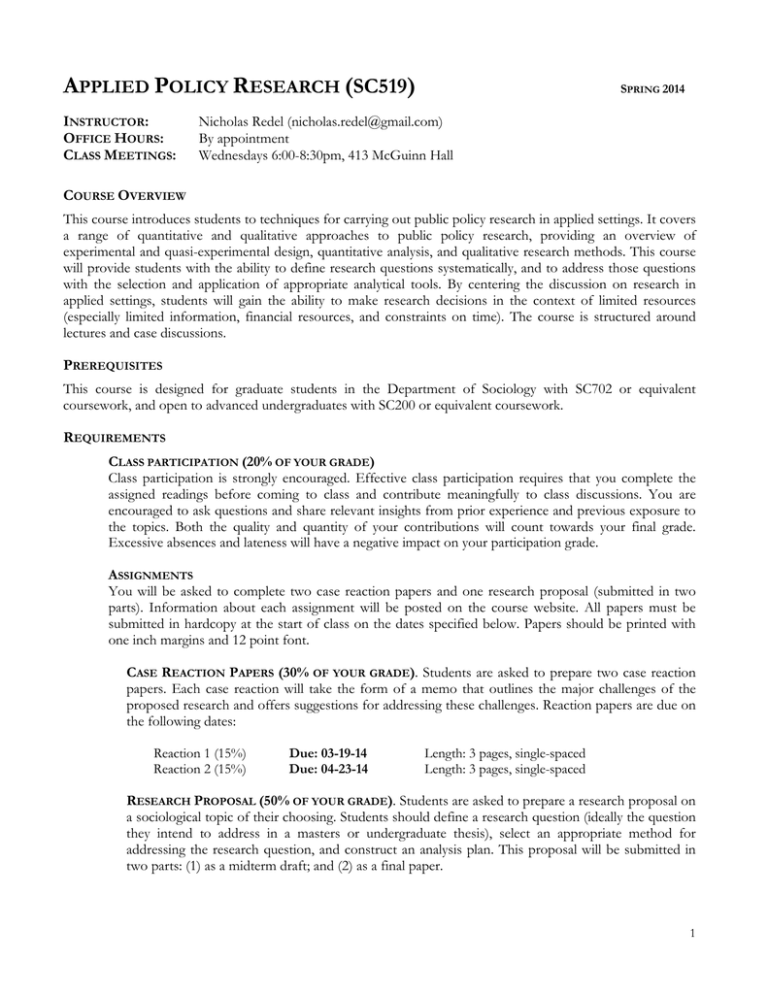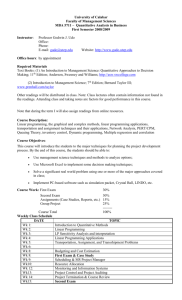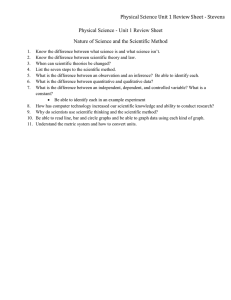A P R (
advertisement

APPLIED POLICY RESEARCH (SC519) INSTRUCTOR: OFFICE HOURS: CLASS MEETINGS: SPRING 2014 Nicholas Redel (nicholas.redel@gmail.com) By appointment Wednesdays 6:00-8:30pm, 413 McGuinn Hall COURSE OVERVIEW This course introduces students to techniques for carrying out public policy research in applied settings. It covers a range of quantitative and qualitative approaches to public policy research, providing an overview of experimental and quasi-experimental design, quantitative analysis, and qualitative research methods. This course will provide students with the ability to define research questions systematically, and to address those questions with the selection and application of appropriate analytical tools. By centering the discussion on research in applied settings, students will gain the ability to make research decisions in the context of limited resources (especially limited information, financial resources, and constraints on time). The course is structured around lectures and case discussions. PREREQUISITES This course is designed for graduate students in the Department of Sociology with SC702 or equivalent coursework, and open to advanced undergraduates with SC200 or equivalent coursework. REQUIREMENTS CLASS PARTICIPATION (20% OF YOUR GRADE) Class participation is strongly encouraged. Effective class participation requires that you complete the assigned readings before coming to class and contribute meaningfully to class discussions. You are encouraged to ask questions and share relevant insights from prior experience and previous exposure to the topics. Both the quality and quantity of your contributions will count towards your final grade. Excessive absences and lateness will have a negative impact on your participation grade. ASSIGNMENTS You will be asked to complete two case reaction papers and one research proposal (submitted in two parts). Information about each assignment will be posted on the course website. All papers must be submitted in hardcopy at the start of class on the dates specified below. Papers should be printed with one inch margins and 12 point font. CASE REACTION PAPERS (30% OF YOUR GRADE). Students are asked to prepare two case reaction papers. Each case reaction will take the form of a memo that outlines the major challenges of the proposed research and offers suggestions for addressing these challenges. Reaction papers are due on the following dates: Reaction 1 (15%) Reaction 2 (15%) Due: 03-19-14 Due: 04-23-14 Length: 3 pages, single-spaced Length: 3 pages, single-spaced RESEARCH PROPOSAL (50% OF YOUR GRADE). Students are asked to prepare a research proposal on a sociological topic of their choosing. Students should define a research question (ideally the question they intend to address in a masters or undergraduate thesis), select an appropriate method for addressing the research question, and construct an analysis plan. This proposal will be submitted in two parts: (1) as a midterm draft; and (2) as a final paper. 1 In the midterm draft, students should define the research question, providing relevant background information and demonstrating a need for the proposed research. Students are encouraged (but not required) to include a detailed outline of the methods section, which will enable me to provide feedback before work commences on the final draft. The final paper should provide a fully articulated research proposal in three parts: (1) the research question, which will consist of revisions to the midterm draft; (2) the research method, selecting an experimental, quasi-experimental, or qualitative design and discussing how the design will be applied; and (3) the analysis plan. The research proposal papers are due on the following dates: Research Proposal, Midterm Draft Research Proposal, Final Paper Due: 03-26-14 Due: 04-30-14 Length: 5-6 pages, double-spaced Length: 12-15 pages, double-spaced ACADEMIC INTEGRITY When working on individual assignments, students are expected to do their own work. Published work should be properly cited. If you have questions about citing work or any other matter, please see me. More information about Boston College’s academic integrity policy is available at http://www.bc.edu/integrity. COURSE MATERIALS This course has two main texts, the book by Rossi, et al (see below) and a coursepack. The Rossi book and coursepack are on reserve at the O’Neill Library and available for purchase at the BC Bookstore. Additional readings (not included in the book or coursepack) will be posted on the course website. These readings are listed on the course schedule in blue. Please note that three chapters have been assigned from the book by Neuman (see below). Chapters 7 and 10 are available on the course website, but due to copyright restrictions chapter 8 cannot be posted online. The Neuman book has been placed on reserve at the O’Neill Library. Rossi, Peter, Mark Lipsey, Howard Freeman (2004). Evaluation: A Systematic Approach. Seventh Edition. Thousand Oaks, CA. Sage Publications. Neuman, William Lawrence (2011). Social Research Methods: Qualitative and Quantitative Approaches. Seventh Edition. Upper Saddle River, NJ. Pearson. COURSE SCHEDULE (SUBJECT TO CHANGE) January 15 Introduction and course overview January 22 Introduction to program evaluation Reading: Decker / Rossi chapter 1 and 3 January 29 Conceptualization, operationalization, validity and reliability Reading: Neuman chapter 7 February 5 Assessing program process and measuring program outcomes Reading: Rossi chapter 6 and 7 2 February 12 Assessing program impact, lecture #1: experimental design Reading: Rossi chapter 8 / Check website for additional readings February 19 Assessing program impact, lecture #2: quasi-experimental design Reading: Rossi pages 265-286 / Check website for additional readings February 26 Assessing program impact, lecture #3: quasi-experimental design Reading: Rossi pages 286-300 / Check website for additional readings March 11 Not a class session but this event might be of interest. MIT Media Lab from 4:30-6:00pm. New Directions in Social Experiments. Presented by Abt Associates. March 12 Data sources: extant data, primary data, and the National Food Study Reading: Gupta chapter 8 / Neuman pages 240-267 and chapter 10 / Check website for case March 19 Experimental and Quasi-Experimental Design Case Speaker: James Mabli, Associate Director of Human Services Research, Mathematica Policy Research Case Reaction #1 due March 26 Quantitative Analysis, lecture #1 Reading: Rossi chapter 10 / Check website for additional readings Midterm paper due April 2 Quantitative Analysis, lecture #2 Reading: Check website for readings April 9 Qualitative Research Design and Analysis, lecture #1 Reading: Strauss pages 10-34 and 39-48 / Marshall chapter 4 April 16 Qualitative Research Design and Analysis, lecture #2 Reading: Marshall chapter 5 / Neuman pages 267-274 / Edin Intro and Appx A-B / Check website for case April 23 Qualitative Research Case Speaker: Kati Kriz, Associate Professor of Sociology, Director College Honors Program, Emmanuel College Case Reaction #2 due April 30 Practical Considerations: Adapting research to real world challenges Final paper due 3





